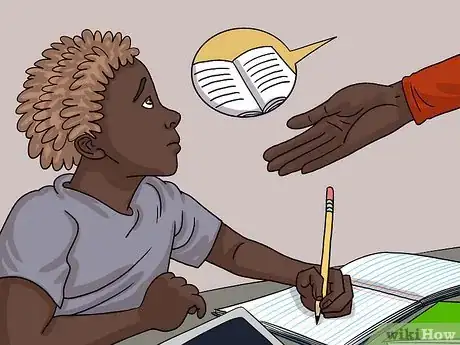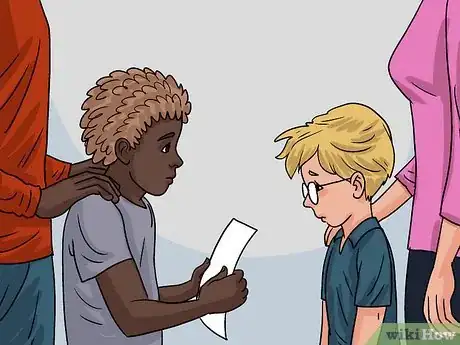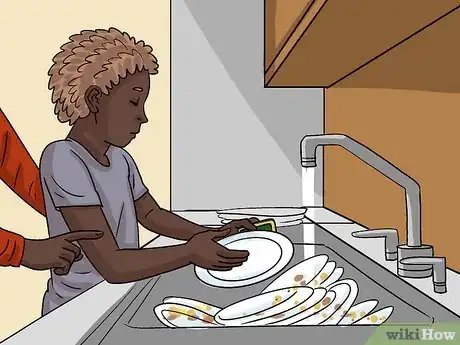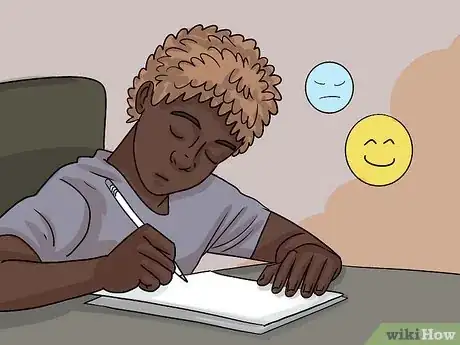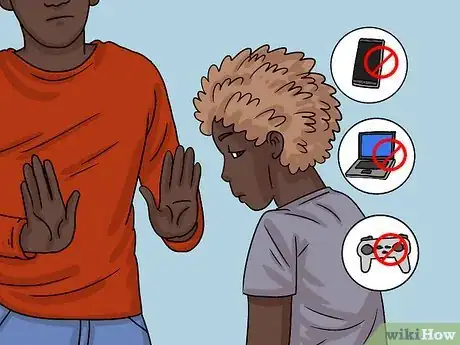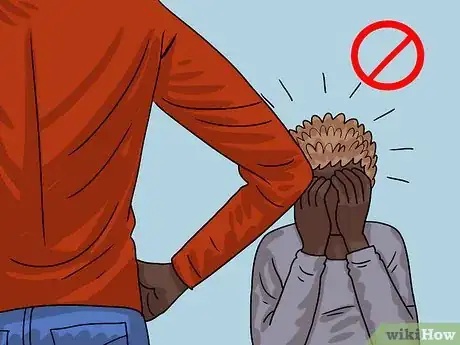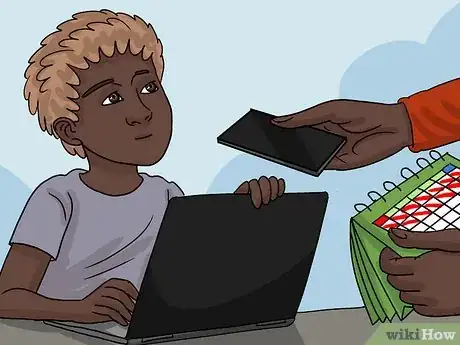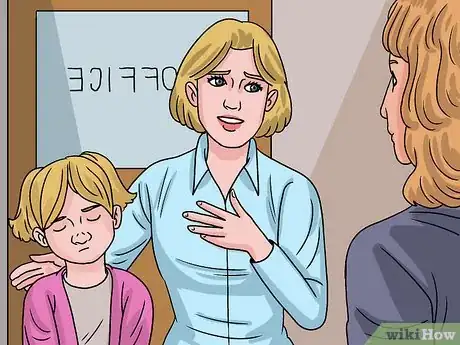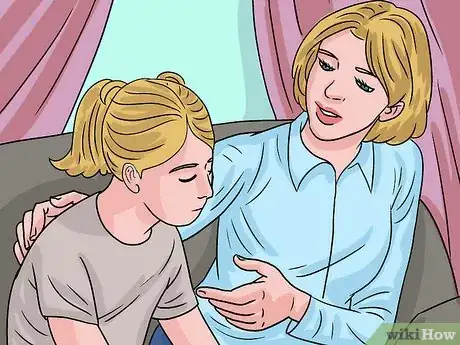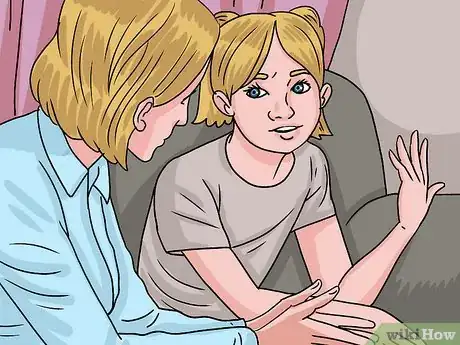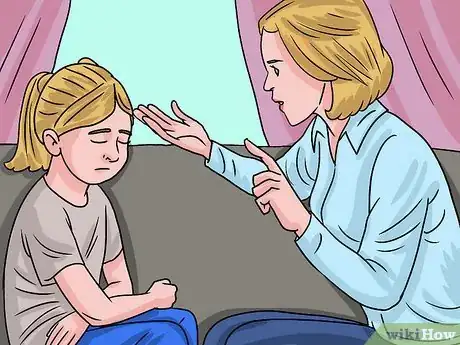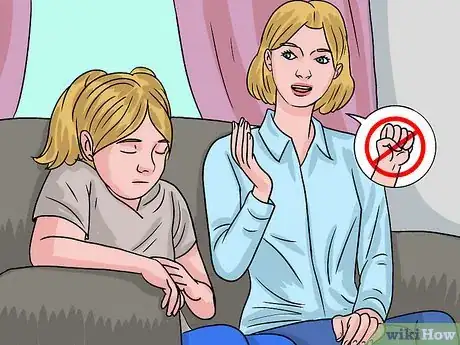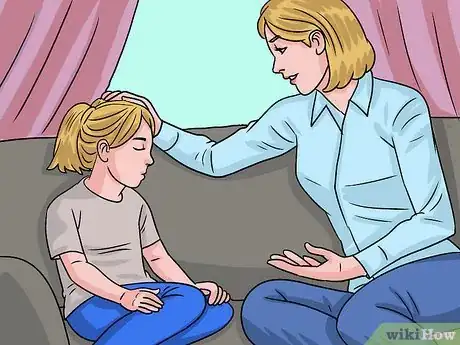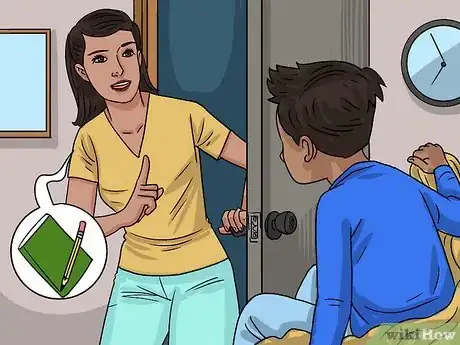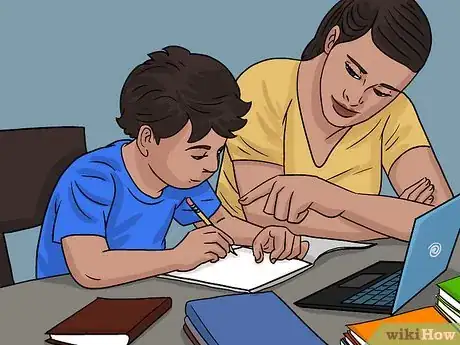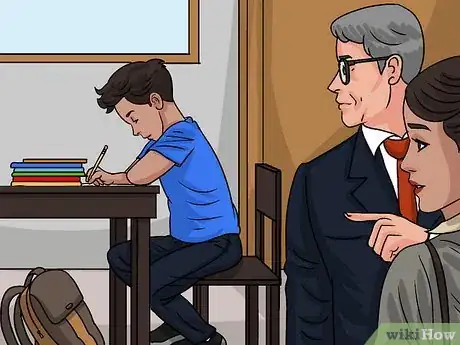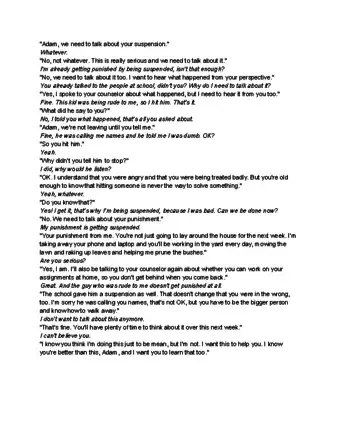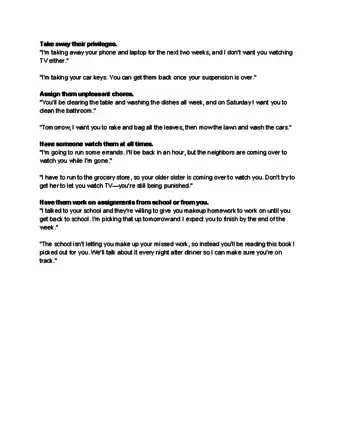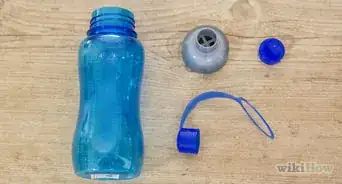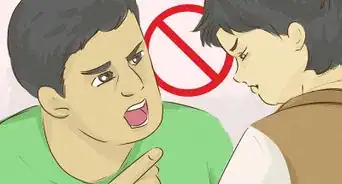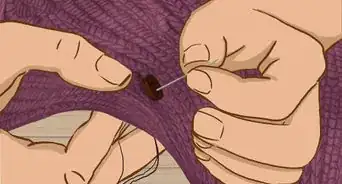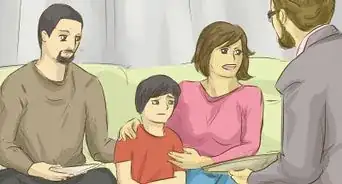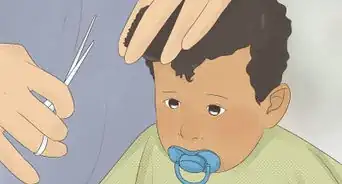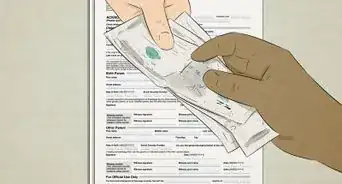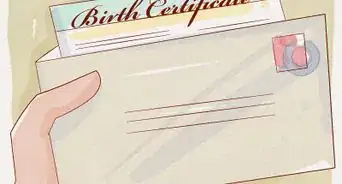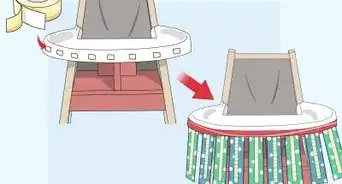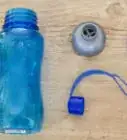This article was co-authored by Klare Heston, LCSW. Klare Heston is a Licensed Independent Clinical Social Worker based in Cleveland, Ohio. With experience in academic counseling and clinical supervision, Klare received her Master of Social Work from the Virginia Commonwealth University in 1983. She also holds a 2-Year Post-Graduate Certificate from the Gestalt Institute of Cleveland, as well as certification in Family Therapy, Supervision, Mediation, and Trauma Recovery and Treatment (EMDR).
There are 11 references cited in this article, which can be found at the bottom of the page.
This article has been viewed 99,641 times.
Finding out that your child has been suspended isn’t easy. Since they’re already being disciplined by the school, be strategic about punishing them at home. Aim to correct their misbehavior with a punishment that relates to their wrongdoing. While disciplining your child is important, avoid taking all of their freedoms away or alienating them. Remind them that they can be honest about any issues that might be contributing to their trouble at school.
Steps
Tailoring the Punishment to the Offense
-
1Focus on having your child make up for their wrongdoing. Come up with consequences that teach your child how to correct their offense. Punishments that focus on making reparations are more effective at correcting behavior than punishments that only restrict privileges.[1]
- For example, if they cheated on a test, you could assign them a project related to the academic subject. Have them research a relevant topic and present their work to you. Let them know they can earn privileges back sooner if they deliver quality work.
- If they bullied another student, you could have had them volunteer with a community organization. Volunteering could broaden their perception of people who different or less fortunate than they are.
-
2Find ways for them to make amends if they bullied another student. Ask their teacher if the other student’s parents would be willing to accept a verbal or written apology. Instruct your child to write a sincere apology, and have them read or send it to the student they bullied. Tell your child to be specific, to acknowledge that they were wrong, and to assure the other student that they’ll improve their behavior.[2]
- For example, instead of being vague, they should write something like, “I was wrong to say those hurtful things about the way you dress. I wanted other people to think I was cool, but I know now that being a bully wasn’t the way to do it. I respect you for being who you are, and I’m sorry I tried to hurt you just for being yourself.”
-
3Have them work around the house if they stole something. Assign extra chores, such as vacuuming, washing dishes, mowing the lawn, doing laundry, and cleaning bathrooms. Let your child know the extra chores are meant to teach them what it means to work hard to earn something.[3]
- If possible, figure out the value of the item they stole. Have them work for approximately the number of hours it’d take to earn that amount at minimum wage. For instance, if they stole a fellow student’s $150 bracelet, and minimum wage is $7.25 per hour, have them work about 20 hours.
- Keep in mind extra chores shouldn’t interfere with schoolwork and other responsibilities. To space out their punishment over 1 to 2 weeks, they could do an extra chore on weeknights for 30 to 60 minutes and work for around 3 hours on Saturday and Sunday.
-
4Assign a project that builds coping skills if they acted aggressively. If your child acted aggressively with a peer or teacher, provide examples of how they can keep their anger in check. After discussing helpful strategies, have them complete a project that requires them to apply the concepts you’ve introduced.[4]
- For example, have them write a 1 to 2 page short story or reflection about how the situation could have ended differently had they controlled their emotions.
- They might write, “My heart started beating faster, and I felt my face get hot. When I feel that way, I should take deep breaths, count slowly, and think of a peaceful place. If I had taken steps to control my emotions, I could have kept my cool instead of yelling at my teacher.”
- If their reactive anger is out of control, you might enroll them in a mindfulness course. When you tell them, make it clear that the course is not a punishment. Explain how the course can help them feel better and make positive changes in their life.
-
5Take away any privileges that were involved with the offense. Restrict privileges related to your child's misbehavior to make a clear connection between their actions and negative consequences. An effective punishment doesn’t just function as a penalty, but makes a child see that their decisions produce specific consequences.[5]
- For example, if they were involved in cyberbullying, take away their cell phone and only allow them to use the computer for school work under supervision.
- If they have a car and skipped school, take away their car keys.
- If they brushed off schoolwork and cheated because they wasted time playing video games, take away their video game console.[6]
-
6Avoid harsh punishments that don’t relate to their misbehavior. Keep in mind that your child is already being punished by their teacher and principal. A reactive, harsh punishment could make them resent you, which will interfere with your ability to correct the underlying issue that prompted their misbehavior.[7]
- Additionally, don’t feel obligated to punish your child for a long duration, such as weeks or months. Restricting privileges directly related to their offense for 1 to 2 weeks can correct behavior more effectively than longer-term punishments.[8]
-
7Let them keep some of their freedom and resources. While restricting specific privileges related to their offense can be effective, don’t strip them of their freedom entirely. Your goal is to use fair, rational forms of punishment to correct misbehavior, not to punish them as harshly as possible out of frustration.[9]
- Furthermore, if you go all out and take away everything, you won’t have additional options if you need to up their punishment. Plus, taking everything away from them might encourage worse behavior and a “nothing to lose” mentality.
- Instead of taking everything away, you might not let them go out for 1 to 2 weeks, but still allow them to talk and text with their friends on the phone.
- It's important that you don't give them a disproportionate punishment because you're upset. Don't decide their punishment while you're at the height of your own emotions. Instead, wait until you've had time to calm down and gain perspective.
Talking to Your Child about Their Actions
-
1Discuss your child’s behavior with their teacher and principal. Listen to the school’s side of the story with an open mind. You might feel the urge to take your child’s side, but remember that children often skip important details to avoid getting into trouble.[10]
- Common reasons for suspension include disobedience, aggressive behavior or violence, stealing, frequent tardiness or absence from school, and drugs or drug paraphernalia.
- Suspensions usually occur in response to long-term behavioral problems. Ask the teacher or principal, “How long has my child been acting out? What have they been doing? How do you recommend we prevent this from getting worse?”
- It can be hard to hear that your child is having trouble at school. Remember that the principal and faculty are there to help you and your child, not to hand out punishments arbitrarily.
-
2Talk to your child when you’re both calm. After getting the school’s side of the story, you should discuss the situation with your child. It’s best to wait at least a day after you and your child learned that they were suspended. Give them some time to process and cool off, and have a conversation when you’re both calm.[11]
- Say, “We need to talk about your situation at school. I don’t want to yell at you or lecture you. I want to hear you out and have a calm, rational conversation.”
-
3Ask them to explain their side of the story. Explain that you respect them and want to get their perspective. You might get a better understanding of why they misbehaved if you get their side of the story. Hear them out, but remember that they might not be giving you all the facts.[12]
- For example, suppose your middle-schooler threw entire rolls of paper towels out of a second-floor window. When you ask them about it, they tell you that they wanted to see if wet paper towels fall faster than dry ones.
- If they seem sincere, you might not want to handle the situation as if it were a random act of vandalism. Emphasize that their actions were wrong, but acknowledge that curiosity can be a good thing as long as they follow the rules.[13]
-
4Make sure they understand why they were wrong. Ask them to put in their own words why they were suspended. Discuss how they could have handled the situation differently and how they can make better choices in the future.[14]
- A suspension is a serious punishment, and schools don’t suspend students without gathering information from all involved parties. If your child denies their involvement, talk to them about the evidence the school used to make the decision.
- For example, suppose they got caught writing graffiti on lockers. If they deny it, let them know that the school showed you a recording of it and a teacher caught them in the act. Remind them there are worse consequences than suspension, and that they could get arrested for damaging or destroying property.
-
5Emphasize that they must respect rules both at school and at home. Mention that they’ll constantly encounter different sets of rules as an adult, from their workplace to social occasions. Let your child know you understand that school rules might be different than rules at home. However, tell them that you still expect them to follow the rules in any setting.[15]
- For instance, if your child hit another student that was making fun of them, you might feel that they were only defending themselves. If it had happened at home, you wouldn’t have punished them for sticking up for themselves.
- However, they still became physically violent and violated school rules. Tell your child you understand why they got angry, but stress that they should have kept their cool and walked away instead.
-
6Encourage them to be honest about any underlying issues. While you should make sure your child acknowledges why they were wrong, try not to alienate them. Let them know that you love and support them, even if you don’t agree with their behavior. Remind them that they can be honest with you if they’re dealing with something stressful or overwhelming.[16]
- It isn’t easy getting a child to open up about their struggles. Observe them and look for any issues with friends, consider whether schoolwork and clubs have them spread too thin, or think of issues at home that might be contributing to their behavior.[17]
Making the Suspension Effective
-
1Work with the school as a united front. Even if you have issues with the school’s decision, don’t openly contradict them in front of your child. Think of yourself and the school staff as partners. If you and the school are in opposition, your child will learn that they can do what they want, then lie to you to get you to come to their defense.[18]
- If you have issues with the suspension, discuss them with the principal privately.
-
2Stick to your child’s normal school day schedule. A suspension shouldn’t be a vacation, so make it clear that they should still consider their suspension days to be normal school days. Make sure they get out of bed and get ready at the same time they normally would. Supervise them, and don’t let them watch television, play video games, or lounge.[19]
-
3Make sure they complete all assigned work. The school will assign homework that your child needs to complete during their suspension. Have them work on the packet during the time they would have been at school. Make sure they finish it and check their work before they go back to school.[20]
- If they finish the packet early, check their work to make sure it’s completed correctly. If the quality is good, have them work on a project for you, such as a written reflection or chores around the house.
-
4Talk to the principal if you work full time and can’t supervise your child. Your child shouldn’t be left home alone during their suspension if no one is available to watch them. Call the principal, tell them your situation, and ask if an in-house suspension is possible.
- An in-house suspension is when your child goes to school but doesn’t go to their ordinary classes. Instead, they remain in a separate room and complete work under supervision.
Conversation Help and Sample Punishments
Expert Q&A
-
QuestionCan a special needs child be suspended from school?
 Klare Heston, LCSWKlare Heston is a Licensed Independent Clinical Social Worker based in Cleveland, Ohio. With experience in academic counseling and clinical supervision, Klare received her Master of Social Work from the Virginia Commonwealth University in 1983. She also holds a 2-Year Post-Graduate Certificate from the Gestalt Institute of Cleveland, as well as certification in Family Therapy, Supervision, Mediation, and Trauma Recovery and Treatment (EMDR).
Klare Heston, LCSWKlare Heston is a Licensed Independent Clinical Social Worker based in Cleveland, Ohio. With experience in academic counseling and clinical supervision, Klare received her Master of Social Work from the Virginia Commonwealth University in 1983. She also holds a 2-Year Post-Graduate Certificate from the Gestalt Institute of Cleveland, as well as certification in Family Therapy, Supervision, Mediation, and Trauma Recovery and Treatment (EMDR).
Licensed Social Worker This will depend on your particular school's policy. However, if you are the parent of a special needs child, make sure you understand the context of the suspension. Make sure that they were not inappropriately suspended for behavior that is not under their control—like swear words by a child with Tourette's Syndrome.
This will depend on your particular school's policy. However, if you are the parent of a special needs child, make sure you understand the context of the suspension. Make sure that they were not inappropriately suspended for behavior that is not under their control—like swear words by a child with Tourette's Syndrome. -
QuestionCan you get suspended for swearing at school?
 Klare Heston, LCSWKlare Heston is a Licensed Independent Clinical Social Worker based in Cleveland, Ohio. With experience in academic counseling and clinical supervision, Klare received her Master of Social Work from the Virginia Commonwealth University in 1983. She also holds a 2-Year Post-Graduate Certificate from the Gestalt Institute of Cleveland, as well as certification in Family Therapy, Supervision, Mediation, and Trauma Recovery and Treatment (EMDR).
Klare Heston, LCSWKlare Heston is a Licensed Independent Clinical Social Worker based in Cleveland, Ohio. With experience in academic counseling and clinical supervision, Klare received her Master of Social Work from the Virginia Commonwealth University in 1983. She also holds a 2-Year Post-Graduate Certificate from the Gestalt Institute of Cleveland, as well as certification in Family Therapy, Supervision, Mediation, and Trauma Recovery and Treatment (EMDR).
Licensed Social Worker This will depend on the particular school's policies. Codes of behavior are usually written out in the student handbook. In a religious school, swearing might be a more serious infraction.
This will depend on the particular school's policies. Codes of behavior are usually written out in the student handbook. In a religious school, swearing might be a more serious infraction. -
QuestionHow do you get out of a school suspension?
 Klare Heston, LCSWKlare Heston is a Licensed Independent Clinical Social Worker based in Cleveland, Ohio. With experience in academic counseling and clinical supervision, Klare received her Master of Social Work from the Virginia Commonwealth University in 1983. She also holds a 2-Year Post-Graduate Certificate from the Gestalt Institute of Cleveland, as well as certification in Family Therapy, Supervision, Mediation, and Trauma Recovery and Treatment (EMDR).
Klare Heston, LCSWKlare Heston is a Licensed Independent Clinical Social Worker based in Cleveland, Ohio. With experience in academic counseling and clinical supervision, Klare received her Master of Social Work from the Virginia Commonwealth University in 1983. She also holds a 2-Year Post-Graduate Certificate from the Gestalt Institute of Cleveland, as well as certification in Family Therapy, Supervision, Mediation, and Trauma Recovery and Treatment (EMDR).
Licensed Social Worker You usually don't get out of a school suspension, and you shouldn't be thinking about it that way. You might do better trying to think through why you or your child was suspended and what behaviors might need to be re-evaluated.
You usually don't get out of a school suspension, and you shouldn't be thinking about it that way. You might do better trying to think through why you or your child was suspended and what behaviors might need to be re-evaluated.
References
- ↑ https://www.psychologytoday.com/us/blog/surviving-your-childs-adolescence/200911/effective-punishment-the-adolescent
- ↑ http://kidshealth.org/en/parents/no-bullying.html
- ↑ https://www.cnn.com/2013/11/05/living/parents-kids-behaving-badly-discipline-rules/index.html
- ↑ https://www.parents.com/toddlers-preschoolers/discipline/anger-management/helping-kids-handle-anger/
- ↑ https://www.cnn.com/2013/11/05/living/parents-kids-behaving-badly-discipline-rules/index.html
- ↑ https://www.parents.com/toddlers-preschoolers/development/behavioral/cheating/
- ↑ http://www.cyh.com/HealthTopics/HealthTopicDetails.aspx?p=114&np=99&id=2239#8
- ↑ http://www.apa.org/research/action/speaking-of-psychology/disciplining-children.aspx
- ↑ https://www.psychologytoday.com/us/blog/surviving-your-childs-adolescence/200911/effective-punishment-the-adolescent
- ↑ https://www.parents.com/kids/discipline/strategies/a-principal-and-mom-on-school-discipline/
- ↑ https://www.psychologytoday.com/us/blog/compassion-matters/201411/six-rules-live-when-you-discipline-your-child
- ↑ http://www.cyh.com/HealthTopics/HealthTopicDetails.aspx?p=114&np=99&id=2239#8
- ↑ https://www.parents.com/kids/discipline/strategies/a-principal-and-mom-on-school-discipline/
- ↑ https://www.psychologytoday.com/us/blog/surviving-your-childs-adolescence/201109/ten-practices-effective-discipline-your-adolescent
- ↑ https://www.parents.com/kids/discipline/strategies/a-principal-and-mom-on-school-discipline/
- ↑ http://www.cyh.com/HealthTopics/HealthTopicDetails.aspx?p=114&np=99&id=2239#8
- ↑ https://www.psychologytoday.com/us/blog/compassion-matters/201411/six-rules-live-when-you-discipline-your-child
- ↑ https://www.parents.com/kids/discipline/strategies/a-principal-and-mom-on-school-discipline/
- ↑ http://www.cyh.com/HealthTopics/HealthTopicDetails.aspx?p=114&np=99&id=2239#8
- ↑ http://www.education.vic.gov.au/Documents/school/principals/participation/suspensionbrochureparenteasyeng.PDF
- ↑ http://www.cyh.com/HealthTopics/HealthTopicDetails.aspx?p=114&np=99&id=2239#8
